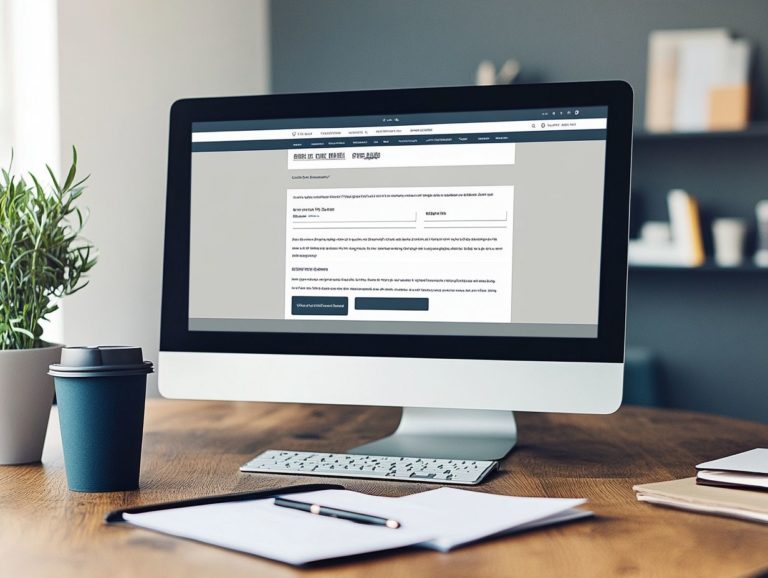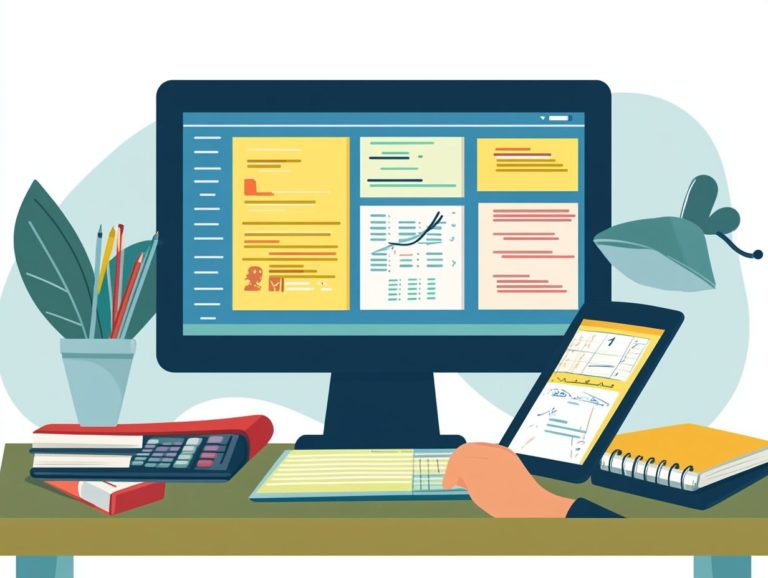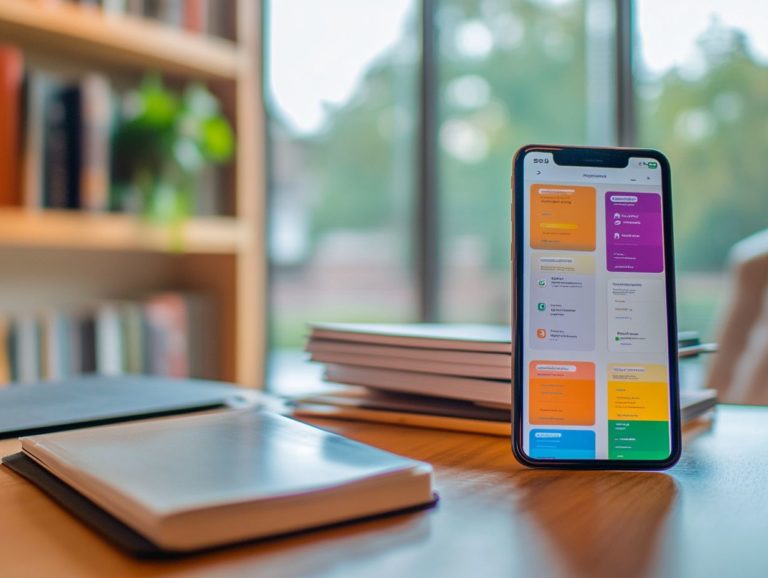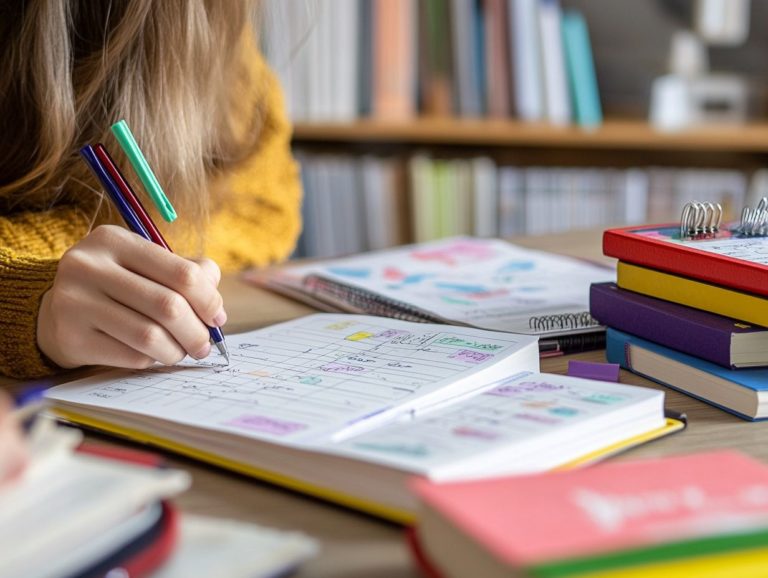5 effective study techniques for practice tests
Studying effectively can transform your exam preparation experience. This guide highlights five essential techniques to elevate your study routine, including crafting a structured study plan, taking meticulous notes, and leveraging the power of flashcards.
It emphasizes the significance of practice tests, showcasing how they can hone your test-taking skills while offering tips to maximize their potential. Whether you re gearing up for finals or aiming to boost your academic performance, these strategies will pave your way to success!
Contents
- Key Takeaways:
- 1. Create a Study Plan
- 2. Take Notes During Class
- 3. Use Flashcards for Memorization
- 4. Practice with Sample Tests
- 5. Review and Analyze Your Mistakes
- What Are the Benefits of Using Practice Tests?
- Frequently Asked Questions
- What are the benefits of using practice tests as a study technique?
- What is the first effective study technique for practice tests?
- How should I approach taking a practice test?
- Is it important to review incorrect answers on practice tests?
- Are there any specific tips for studying for multiple choice practice tests?
- How can I make the most out of practice tests as a study technique?
Key Takeaways:

- Create a study plan to manage your time effectively.
- Use flashcards to improve memorization and retention of key concepts.
- Regularly practice with sample tests to familiarize yourself with the test format.
1. Create a Study Plan
Creating a structured study plan is essential for effective learning. It guides you through your academic journey and enhances your focus and ability to retain knowledge.
A well-organized study plan incorporates various educational techniques tailored to your learning style and goals, ultimately aiding in your achievement and improving your performance on assessments.
Set clear milestones to act as checkpoints, providing motivation and direction along your educational path.
Integrate active studying methods, such as summarization and self-explanation, to promote deeper comprehension and engagement. Don t overlook retrieval practice activities like flashcards or practice tests to boost your memory recall significantly.
Flexibility is crucial; adapt your plan based on your performance and feedback to ensure it meets your needs. Regularly review previously covered material to solidify your knowledge, keeping you well-prepared for future assessments.
2. Take Notes During Class
Taking notes during class enhances memory retrieval and cognitive processing. It transforms passive listening into active engagement.
Employ various note-taking methods tailored to your learning style, boosting information retention.
- The Cornell Method organizes notes by dividing the page into sections for easy review.
- Outlining creates a structured hierarchy of main ideas, while mind mapping visually captures the relationships between concepts.
Summarizing information in your own words deepens your understanding and aids memory recall.
Utilizing these techniques supports effective study habits and makes retrieval practice more efficient, paving the way for greater academic success.
3. Use Flashcards for Memorization
Flashcards are invaluable for memorization, harnessing spaced practice principles to elevate knowledge retention.
Keep information on each card concise and clear to simplify processing. Adding visuals like diagrams or images can further engage your brain, forging stronger connections with the material.
Engage in active recall to enhance learning outcomes. By consistently incorporating flashcards into your study routine, you reinforce the neural connections associated with the content.
Designate specific times for flashcard reviews and vary subjects to create a dynamic study atmosphere that keeps your motivation high.
Start implementing these techniques today! Transform your study habits and achieve academic success.
4. Practice with Sample Tests

Practicing with sample tests simulates exam conditions. Incorporating 5 study habits to improve test performance can enhance this process, as the use of recalling information helps reinforce your learning.
This practice involves various test formats. You’ll face multiple-choice questions that test your quick thinking and open-ended questions that encourage deeper analysis.
Timing is key to managing your pace. It prepares you to answer within a limited timeframe.
Reviewing feedback from practice sessions helps you spot knowledge gaps. You can refine your study methods for focused preparation.
5. Review and Analyze Your Mistakes
Analyzing your mistakes is vital for growth. It provides insights that enhance your learning techniques.
Reflecting on errors helps uncover thinking patterns and misconceptions. Journaling your thoughts and feelings about challenging questions tracks progress and boosts critical thinking.
Group discussions foster collaboration. You benefit from different viewpoints and constructive feedback from peers.
These reflective practices guide your future study sessions. They ensure you focus on addressing weaknesses and enhancing skills.
What Are the Benefits of Using Practice Tests?
Practice tests offer numerous advantages. They reinforce learning and deepen your understanding of the material based on research in psychology.
These tests boost retention and engage you with content. They also build your confidence by familiarizing you with question formats.
Research shows that students using practice tests develop better time management skills. To enhance this process, consider following these 5 tips to ace your next practice test, which can help allocate study hours effectively and focus on improvements.
This approach aids long-term retention and fosters a proactive learning environment. It leads you toward greater academic success.
How Can Practice Tests Help Improve Test-Taking Skills?
Practice tests sharpen your test-taking skills. They familiarize you with the exam format and improve your time management.
Simulated conditions reduce anxiety and enhance resilience under pressure. Create a quiet space, use a timer, and replicate actual test conditions closely.
Incorporate breaks and remove distractions to build mental endurance for test day. After each test, review your performance to identify areas for improvement.
This reflective process boosts your confidence and ensures consistent progress toward your goals.
What Are the Different Types of Practice Tests?

Discover the various types of practice tests available! Each type is designed to assess knowledge in distinct ways. These include ongoing assessments that provide feedback during the learning process, multiple-choice questions, and essay formats tailored to meet different learning objectives.
These formats help teachers evaluate understanding. They also support different student learning styles.
For instance, ongoing assessments provide feedback, helping you identify areas that need improvement. Meanwhile, multiple-choice questions allow for a quick gauge of understanding, particularly benefiting those who excel with instant recall.
Essays, on the other hand, challenge you to articulate your thoughts and engage deeply with the material, fostering critical thinking skills. By integrating various practice test types, you can optimize your study efforts and enhance your overall mastery of the subject matter.
How Often Should One Take Practice Tests?
Determining how often you take practice tests is vital for optimizing your learning journey. Implementing spaced practice significantly boosts your retention and understanding of the material over time.
By strategically spacing out your testing sessions, you create a solid framework that leverages intervals of forgetting, essential for long-term retention. For example, if you’re preparing for exams in subjects like mathematics or languages, frequent, shorter practice sessions can be particularly beneficial.
Mixing varied question types reinforces different skills. If you’re tackling complex subjects like science or history, longer intervals between tests may allow for deeper cognitive processing.
Ultimately, tailoring the frequency of your practice tests to align with your study habits and the demands of each subject can transform your learning experience into something effective and enjoyable. For those looking to enhance their preparation, exploring 5 study techniques for retaking exams can be incredibly beneficial.
How Can One Make the Most Out of Practice Tests?
To truly maximize the benefits of practice tests, engage in active studying, analyze your performance, and apply the top 5 strategies for effective practice tests to refine your study techniques for better outcomes.
Dive deep into the results of each practice test to uncover patterns in your incorrect answers pinpoint specific topics needing more attention or recognize the types of questions that often trip you up.
Keeping a reflective journal allows you to document these insights alongside feedback from teachers or peers, giving you a clearer view of your progress over time.
Setting targeted study plans that address your weaknesses ensures a focused approach and boosts your confidence as you track improvements. This creates a dynamic learning cycle, enriching your preparation for future assessments.
What Are Some Common Mistakes to Avoid When Using Practice Tests?
Common mistakes when utilizing practice tests can undermine their effectiveness. For instance, neglecting to review answers, failing to simulate real testing conditions, and relying solely on practice tests without integrating other study methods are pitfalls to avoid. To enhance your approach, consider these 5 ways to maximize your practice test results.
These errors can create a false sense of preparedness and diminish your overall learning experience. To enhance the utility of practice tests, prioritize a thorough review of each answer, distinguishing between correct and incorrect responses to gain deeper insights into your knowledge gaps.
Creating an environment that mirrors actual test conditions can significantly boost your performance, as it helps replicate the pressures of real testing scenarios. Additionally, employing 5 study techniques for improving test scores in a balanced study plan that incorporates various educational methods like active recall, spaced repetition, and collaborative study sessions enables you to grasp concepts more effectively and retain information longer.
Frequently Asked Questions

What are the benefits of using practice tests as a study technique?
Practice tests simulate the actual test-taking experience, identify areas of weakness, and improve overall understanding and retention of material.
How will you integrate practice tests into your learning routine?
What is the first effective study technique for practice tests?
Create a study schedule. Include specific times for taking practice tests and reviewing material.
How should I approach taking a practice test?
Treat it like the actual test. Follow all rules and time limits to get comfortable with the format and boost your confidence.
Is it important to review incorrect answers on practice tests?
Absolutely! This is where the real learning happens, and it can make all the difference. Make notes on why you got a question wrong and review the material again.
Are there any specific tips for studying for multiple choice practice tests?
Practice getting rid of wrong answer choices. Use what you know to make smart guesses. Pay attention to keywords in the questions and answers.
How can I make the most out of practice tests as a study technique?
Take practice tests in a quiet, distraction-free environment. Simulate real testing conditions as closely as possible. Additionally, consider these 5 effective ways to review before a test by reviewing and understanding all your answers, focusing on both correct and incorrect responses.






